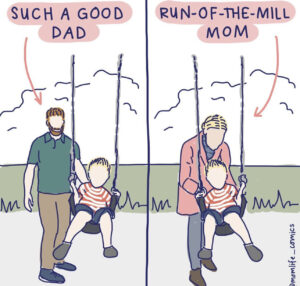“How was it?” I asked my husband upon returning from a three day business trip.
It was the first time I’d been away since all three of our children were born, and I had been nervous when I left. I expected him to regale hellish tales of the baby (who was still breastfeeding), the pandemonium of bedtime, and how he barely scraped through by the skin of his teeth. He looked tired, no doubt from the time he had spent cleaning the house before I came home, a kindness that was not lost on me. Yet instead of telling me he barely survived without me, he told me he had thrived.

“It was great,” he said triumphantly. Yes the baby had been difficult at night, and the older two had their regular tiffs and tantrums, but overall it was much easier than expected. They even went to the park. “It’s not nearly as bad as you make it out to be. I could totally be a stay-at-home dad.”
I don’t remember if I said anything after that; if I started crying or went to bed stewing in resentment. I simply remember feeling indignant.
I see what you do, he seemed to say, and it’s not that hard.

I remember wanting to yell at him, to tell him that one weekend of successful solo-parenting is not the same as being on 24/7. He didn’t know the grinding exhaustion of doing the housework, taming the tantrums, making the meals, and thinking about everything that needed to be done day after day after day. He didn’t know what it actually felt like to live with the expectation of keeping this routine running with no end in sight.
Looking back, I know his words were meant to be reassuring. He wanted me to know he could keep things operating while I was away—wanted to assuage the mom guilt I inevitably felt being away from my children. Instead, I felt even more guilty, reminded of how often I complained about the difficulties of day-to-day motherhood. Moreover I resented that he didn’t understand why it was that hard.
But really, how could he understand in that bone-tired, no-end-in-sight sort of way what it is like to live this role? He will always come away from a weekend, a day, even a half hour at the park with our kids dripping in gold stars—if not from me then from strangers, family, friends, everyone. He’s never going to feel invisible in his role as a father, like I do as I move through the background, cleaning up piles of scattered laundry and preempting unseen disasters. Even if he is doing the same mundane work that I do, someone will always see, always notice, always lift him up as an exalted one among men. He’ll always be the hero.

It’s not that I necessarily envy the praise my husband receives, but rather that I envy the simplicity of what counts, for him, as a job well done. He fed them, took them to the park once, probably lost his cool with them a couple times but managed to get everyone back on track and in bed at somewhat decent hours. It was a mostly good weekend. It was a job well done. He didn’t go to sleep wondering if he’d spent enough time reading with them or berating himself over moments of frustration or not being present enough or worrying over whether their meals were well balanced or chastising himself for allowing screen time. He’s not constantly in his head about how he ought to be better. He knows when good enough is good enough.









